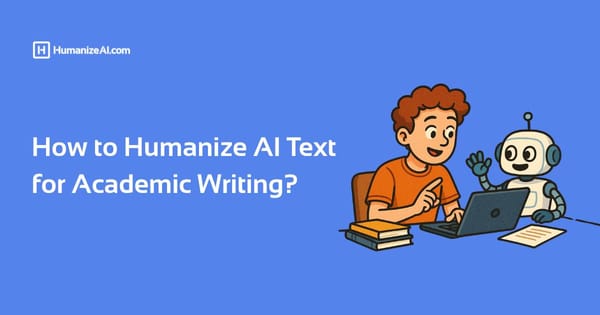10 Ways to Make AI-Generated Text Sound More Human

In 2026 one of the biggest challenges with AI generated content is that it often still feels robotic repetitive or lacking in personality. As the use of AI writing tools continues to grow the ability to refine this raw output into something more natural has become an essential skill for students creators marketers and business owners.
Making AI text sound more human is not just about style. It is about building trust and connection with your audience. When words feel authentic and relatable readers are more likely to engage share and act on your message.
This guide will walk you through 10 practical ways to transform robotic sounding AI content into warm human like writing in 2026 that truly resonates with your audience. If you want to make the process even easier you can use the Humanize AI Paraphraser Tool to quickly refine awkward sentences or try the Humanize AI Humanizer for a complete solution that converts stiff AI text into natural flowing content.
1. Edit Thoroughly

Pro Tip: Use a text to voice tool to listen to your content. This can help you catch awkward phrasing that you might miss when reading silently.
The first and most crucial step in humanizing AI-generated content is thorough editing. AI can provide a solid foundation, but human touch is essential for refinement.
My Experience: I've found that dedicating at least 30-45 minutes to editing a 1000-word AI-generated piece can make a world of difference. Here's my process:
- Read through the entire piece without making changes
- Identify areas that sound unnatural or robotic
- Rewrite sections to add flow and personality
- Check for consistency in tone and style
- Proofread for grammar and spelling errors
2. Add Personal Anecdotes

One of the most effective ways to make content sound more human is to incorporate personal experiences and anecdotes.
My Approach: When I'm working on a piece about productivity tools, instead of just listing features, I share how a particular tool helped me meet a tight deadline or organize a complex project. For example:
"While testing various project management tools, I found myself overwhelmed with a sudden influx of freelance work. Trello's intuitive board system allowed me to visualize my workload and prioritize tasks effectively, turning potential chaos into a manageable workflow."
3. Vary Sentence Structure

AI-generated content often falls into patterns, using similar sentence structures repeatedly. Breaking this monotony is crucial for a more human touch.
Technique: Mix short, punchy sentences with longer, more complex ones. Use rhetorical questions, exclamations, and even occasional fragments to create a more natural rhythm.
Before (AI-generated): "AI tools can improve productivity. They can automate repetitive tasks. This saves time for more important work."
After (Human-edited): "Ever wondered how much time you waste on mundane tasks? AI tools can be a game-changer. By automating repetitive work, they free up your schedule for the big-picture stuff – you know, the projects that actually excite you!"
4. Include Colloquialisms and Idioms

Sprinkling in everyday expressions and idioms can instantly make your content sound more conversational and human.
My Favorite Approach: I keep a running list of common phrases and idioms that fit my brand voice. When editing AI content, I look for opportunities to naturally incorporate these expressions.
Example: "While AI can generate content quickly, it's not a silver bullet. You'll still need to put in the elbow grease to polish it up and make it shine."
Word of Caution: Be careful not to overdo it. Too many idioms can make your content feel forced or inauthentic.
5. Incorporate Emotion

AI often struggles with emotional nuance. Adding emotional language and context can significantly humanize your content.
AI tools can produce grammatically perfect sentences but often miss emotional depth and authentic tone that make writing relatable. If you’re wondering How to humanize ai content effectively, then platforms like HumanizeAI.com can help you turn robotic text into natural, reader-friendly wri
Strategy: Identify key points in your content where emotional resonance would be impactful. Then, infuse those sections with appropriate emotional language.
Before (AI-generated): "Using AI tools can lead to increased efficiency in content creation."
After (Human-edited): "Discovering the power of AI in content creation was a revelation for me. The excitement of seeing hours of work condensed into minutes was palpable – it felt like unlocking a superpower!"
6. Use Rhetorical Questions

Engaging your reader with thoughtful questions can make your content feel more like a conversation than a lecture.
My Experience: I've found that starting sections with questions helps draw the reader in and makes them more invested in the content. For example:
"Have you ever stared at a blank page, feeling the pressure of a looming deadline? We've all been there. But what if I told you that AI could help you overcome writer's block?"
7. Add Humor (Carefully)

Humor can be a powerful tool for making content more relatable and human, but it needs to be used judiciously.
My Approach: I aim for gentle humor that aligns with the topic and doesn't detract from the main message. Self-deprecating jokes or lighthearted observations often work well.
Example: "Let's face it, even the most advanced AI hasn't mastered the art of procrastination like us humans. While it's churning out content, we're probably on our third coffee break, contemplating the meaning of life… or just scrolling through cat videos."
Important Note: Humor should always be appropriate for your audience and brand voice. When in doubt, err on the side of caution.
8. Include Cultural References

Incorporating relevant cultural references can make your content feel current and relatable.
Strategy: Stay up-to-date with popular culture, current events, and trending topics in your industry. Weave these references into your content where appropriate.
Example: "Much like the characters in 'Succession' vying for control, different AI writing tools are competing to be the top choice for content creators. But unlike the Roy family drama, this competition is actually beneficial for us users."
Pro Tip: Be mindful of your audience's demographics and cultural background to ensure your references resonate.
9. Provide Unique Insights

While AI can compile information, it can't provide the depth of insight that comes from personal experience and expertise.
My Approach: For each main point in my AI-generated content, I ask myself, "What unique perspective can I add here?" This often leads to insights that set my content apart.
Example: "While AI suggests using keywords for SEO, my experience has shown that obsessing over keyword density often leads to awkward, unnatural writing. Instead, you can focus on creating valuable, well-structured content that naturally incorporates relevant terms. Search engines (and readers) are smarter than we give them credit for."
10. Maintain a Consistent Voice

Consistency in tone and style throughout your content is key to making it sound authentically human.
My Technique: I’ve developed a ‘voice guide’ for my content, which includes:
- Preferred pronouns (I use “you” and “we” to create a sense of connection)
- Tone (friendly but professional)
- Vocabulary level (accessible but not oversimplified)
- Brand-specific phrases and terms
When editing AI-generated content, I refer to this guide to ensure consistency.
Tip: Read your content aloud. If it sounds like something you’d naturally say, you’re on the right track.
Conclusion
Thank you for reading this guide on humanizing AI-generated content. Remember, the goal isn’t to disguise AI assistance, but to leverage it as a tool that enhances, rather than replaces, human creativity. With practice, you’ll find the perfect balance between AI efficiency and human touch in your content creation process.



